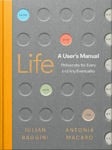Philosophy & World Religion
View as
Sort by
The Pig that Wants to Be Eaten: And 99 Other Thought Experiments
9781847081285
The long-awaited reissue of this Granta Books backlist classic: a collection of short, accessible philosophical quandaries to stimulate, challenge and entertain!
€12.81
The Ego Trick
9781847082732
'In this entertaining, educative and gracefully written book, Julian Baggini explores the questions of the nature of the self and in what sense it persists through time ... This is one of the best, most readable and most stimulating introductions yet written about this intriguing topic' - AC Grayling
€11.71
The Pig that Wants to Be Eaten: And 99+ Other Thought Experiments
9781803510477
A collection of short, accessible philosophical quandaries to stimulate, challenge and entertain.
€12.87
How the World Thinks: A Global History of Philosophy
9781783782307
The first ever global overview of philosophy: how it developed around the world and impacted the cultures in which it flourished, now in paperback.
€12.72
The Godless Gospel: Was Jesus A Great Moral Teacher?
9781783782321
Do Jesus's teachings add up to a coherent moral system, still relevant today? From the Sunday Times bestselling author of How the World Thinks.
€11.44
The Godless Gospel : Was Jesus A Great Moral Teacher? **exp
9781783786695
Even if we don't believe that Jesus was the son of God, we tend to think he was a great moral teacher. But was he? And how closely do idealised values such as our love of the family, helping the needy, and the importance of kindness, match Jesus's original tenets?Julian Baggini challenges our assumptions about Christian values - and about Jesus - by focusing on Jesus's teachings in the Gospels, stripping away the religious elements such as the accounts of miracles or the resurrection of Christ.
€17.73
Life: A User's Manual ***EXPORT
9781529104547
Ever felt as though life would be simpler if it came with an instruction manual? There are no easy answers to the big questions. And life does not follow a straight path from A to B.
€16.98














